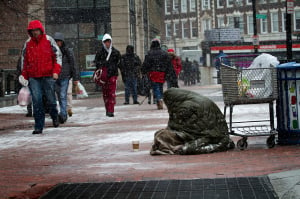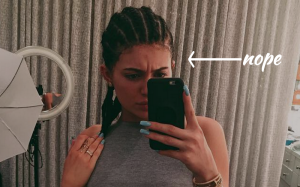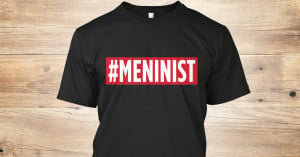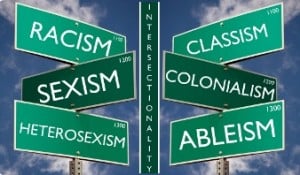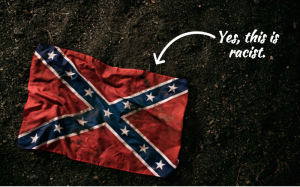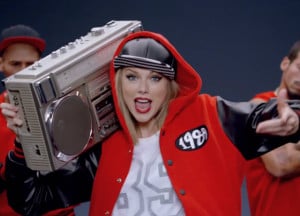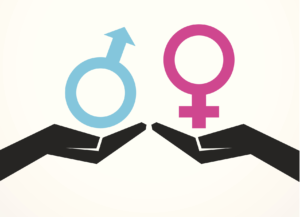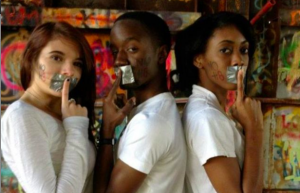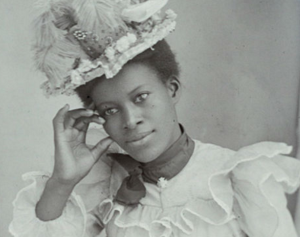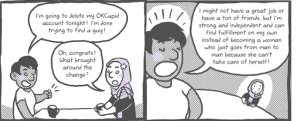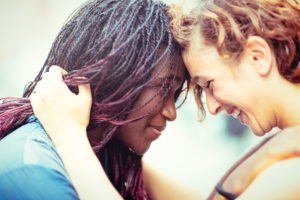
Two people press their foreheads together, smiling and holding one another.
Three years ago, I was struggling to make it through each day. On the outside, it looked like I was doing all right: I could smile and talk like I was enjoying life, and I was mostly staying on top of work and school.
In reality, though, I alternated between numbness and despair.
The household I lived in was a hotbed of abuse and toxicity, which was a huge contributor to the depression that swallowed me. I got to experience one of the worst potential downsides to polyamory: Having multiple partners at the same time that were abusive and harmful to me.
Self-worth has always been something I’ve struggled with, and this time in my life completely destroyed it.
I thought the abuses I faced were just my normal lot in life. A lot of the time, I thought I deserved them.
Flash forward to today: I live in a completely different polyamorous household, with people who show me every day how much they value and care about me.
I’m surrounded by love, and my plans for the future are free of fear and dread. I’m able to write again – something depression took from me – and I’m full of ideas for what I want to create in the world.
Self-worth is still a struggle, but I can see the progress I’ve made almost every day. I’ve been learning to advocate for myself, to believe that I deserve to be treated well.
I’ve even started learning to look at myself with a kind and compassionate eye, instead of the cruel, critical gaze that I was used to.
They say that “you can’t love someone else until you’ve learned to love yourself,” but for me, in many ways, the opposite was true.
There were so many people who loved me and took care of me as I healed from my toxic experiences, and they helped me start to learn to love myself again. To believe that I was worth loving.
Don’t get me wrong – I had to do a lot of work to heal, too. I wasn’t just sitting there in my self-loathing until someone came along to rescue me.
But I’d be lying to say I did it all myself, or that I didn’t absolutely need the love and support that helped me heal.
I think it’s important to tell these stories because we often talk as though it’s got to be one or the other. Either you’re tough enough to make it out of depression, abuse, and other struggles all on your own, or you’re just passively waiting to be rescued.
In truth, I think it’s often both. Most of us can’t do it all on our own. It’s okay to need good, caring people. The healing that can come from being loved by others is profound and important.
Honestly, a lot of the “work” I did was being open to receiving love, even when it didn’t make sense to me.
When someone told me I was valuable, I tried to at least believe that they meant it, even if I couldn’t quite believe it myself. I spent more time with the people who made me feel okay and less time with the people who made me feel worthless.
Sometimes that felt like a selfish choice, but it turned out to be crucial to my recovery.
Everybody’s depression is different; everybody’s abuse history is different. I’ve been lucky in some ways, and unlucky in others. I’m not trying to give a roadmap out of the darkness – I’m not nearly qualified for that.
I just want to tell a few stories from my own experience. These are some ways people showed me love and care, and taught me to love myself better.
My hope is that sharing the loving statements I’ve heard will help counter the idea that we have to heal all on our own before we can be worthy of love.
1. ‘You Can Tell Me’
I like to think of myself as an honest person, but some truths are really hard and really scary.
I had a lot of partners insist that I be honest and open with them, while also using the things I shared to manipulate me, or throwing them in my face when we had a fight.
And yet, they insisted – and I accepted – that my “failure” to be fully honest and open was my problem.
Then I met Greg.
Greg was unfailingly kind and compassionate. He never demanded that I share things with him – he just asked because he was interested in me and cared about me.
With him, for the first time, I stopped worrying about the consequences of saying or not saying something that was on my mind.
I knew he wouldn’t judge me or use it against me if I shared, and would understand if I kept something back because I wasn’t ready to say it.
Because of this, I was able to tell him about incidents of abuse that I had kept secret from everyone else.
He made it clear that he cared for me and was concerned for me, but that he would support me no matter what I did. Saying out loud what had happened helped me to recognize how serious it was.
He created a safe space for me to be honest with him, which in turn helped me be fully honest with myself.
I realized that it’s okay to have boundaries around what I share with people. It doesn’t make me a fundamentally dishonest person – it means I’m being smart and protecting myself when people haven’t earned my trust.
With Greg, it still took a little effort to get myself to share with him, but it felt completely different. I knew I would be safe with what I said, even though it was hard to get the words out.
Now that feeling of safety is something I look for in relationships, and I save my efforts to be completely open until I’ve found it.
2. ‘You Deserve Better – And You’ll Have It Someday’
A relationship or moment doesn’t have to be perfect to be helpful. Sometimes the love that has lifted me up has come from some very unlikely places.
At one of my low points, I almost decided to get a tattoo that would express my feelings of worthlessness. At the time I thought of it as empowering – since I couldn’t get rid of these feelings, I may as well own them by imprinting them on my skin.
I floated the idea by a few people in my life and they seemed to think it was a cool idea. Except Jon.
Jon was a fling-turned-friendship that I saw every so often. When I told him about my tattoo idea, he got angry.
I’ll never forget his face and voice as he sat opposite me at the café table, passionately insisting that I was not worthless and that I was not going to feel this way forever.
I couldn’t believe someone actually thought that.
In the ordinary run of things, I’m not down with critiquing other people’s tattoo plans. At that moment, though, he gave me what I needed.
He believed that someday I would feel worthy and happy again, when I had lost all ability to imagine it.
I used to think relationships could only be good for me if they were long-term and devoted. But Jon gave me this moment of insight and hope, and that made a huge difference.
It’s okay to look for those moments of insight, or just of feeling good, and accept them for the gift that they are rather than trying to make the context perfect.
3. ‘You’re My World’
This is the part where I rave about my kitten.
She is the cutest, y’all. She is a ferocious little monster and I love her to pieces.
She also helped me survive the months after I left my husband.
I was living in a tiny studio apartment. From the outside, it looked like I was coping pretty well, but most of my life was a haze of confusion, guilt, and anxiety.
Enter Sabrina. I was walking home one night and this teeny kitten was playing on the sidewalk.
I stopped to pet her for a little while, then reluctantly went on my way… except she followed me. She would scamper on ahead for a few feet, then stop and look back, waiting for me to catch up.
In a few short blocks she’d captured my heart, and I took her in “just for the night.” You can guess how that turned out.
Healing love doesn’t always have to come from people.
Sabrina was a spot of pure, uncomplicated joy and affection in my life. She made my new apartment feel like home. She gave me something to think about besides loss and conflict and trauma.
On a cold winter night, when I was struggling with the guilt of “abandoning” an abusive partner, I could look at her curled up cozily and think, “You are safe and warm because of me. I must not be all that bad.”
4. ‘We Like Being Around You’
It was my first birthday after leaving my toxic household. The opening music to the Buffy episode “Once More With Feeling” played, and with the first line a dozen voices rose around me singing along in chorus.
I felt a swell of happiness that I hadn’t felt in a long time.
Buffy helped get me through the worst of my depression, so it meant a lot to me to be sharing the musical episode with my friends – but it was more than that.
When I left my former household, I was sure I would lose all my friendships. Everybody I knew knew us as a unit. People came to our house, or invited us all to come over as a group.
In the messy aftermath of leaving my household, I expected to just drop off these friends’ social radar. Inviting me around would create awkwardness, and I didn’t really believe they’d want to hang out with just me anyway.
But here they were at my birthday, singing along and loving a thing I also loved.
The months that passed proved me partially wrong – I did lose some friends, but many people kept inviting me to parties and making time to see me.
It was tempting to avoid them completely out of my fear that they wouldn’t want to see me, and it was tempting to tell myself things like, “they don’t really want you to come, they invited you because they want more bodies at the party.”
But I fought that temptation and took the risk of going anyway. I let myself hope that they meant it when they said they’d like to see me.
And I started to feel that maybe I was valuable on my own.
5. ‘You’ll Make the Right Decision’
Whether or not to stay in my marriage was the hardest decision I’ve ever faced.
I had scolding voices on either side of me: “If you stay you’re weak, you’re enabling, things will only get worse and it will be your fault” screamed against “If you leave you’re giving up, you don’t take marriage seriously, you’re making too big a deal out of things.”
I was in my therapist’s office fretting over these conflicting voices. She listened for a while, and then she just said, “It’s a hard decision, but I know you’ll make the right one.”
I was floored. She seemed entirely confident that I was capable of weighing the situation and coming to a good decision. All my life, people had been trying to manage and steer my choices, and it left me feeling like I was in constant danger of going wrong.
I didn’t even realize until that moment how deeply I’d internalized the idea that I was basically foolish and selfish and incapable of making a wise, healthy decision on my own.
I went home and told my best friend what my therapist had said, and she immediately agreed, “Oh, yeah! You’re smart and you’re a good person. You will definitely make the right decision, whatever that is.”
It was my first step in learning to trust myself, rather than seeking advice from a hundred sources and spinning my wheels till I was exhausted.
***
We don’t have to do it all ourselves. Sometimes the best thing we can do is let the people who care about us show us how to love ourselves.
It doesn’t have to be that perfect romance swooping in from the sky to rescue us: It can be friendships, casual intimacy, online friends, and even pets and therapists.
Healing love can come from lots of places, and it’s okay to be open to receiving it, wherever it comes from.
People who tell you you need to be whole and healthy before you can be loved are getting it backwards. No matter where you are in life, you deserve love.
[do_widget id=’text-101′]
Ginny Brown is a Contributing Writer for Everyday Feminism, as well as a speaker and educator specializing in sexuality and relationships. She writes for various publications and has her own blog here. She lives in the Philadelphia area with her poly family and three cats. Follow her on Twitter @lirelyn.
Search our 3000+ articles!
Read our articles about:
Our online racial justice training
Used by hundreds of universities, non-profits, and businesses.
Click to learn more
Most Read Articles
- « Previous
- 1
- …
- 30
- 31
- 32





